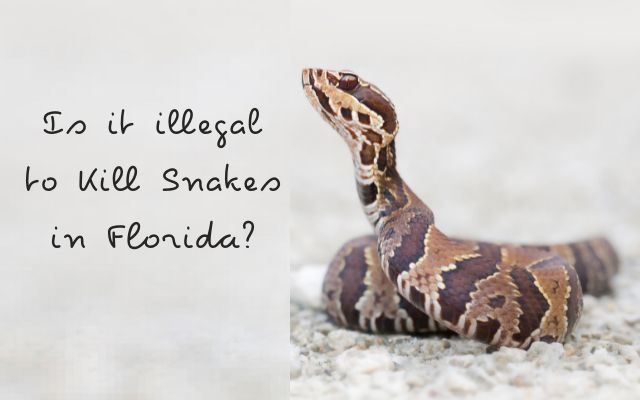Is it illegal to Kill Snakes in Florida? This question often arises when encountering these slithering creatures in the Sunshine State. Understanding the legalities surrounding snake extermination is crucial for residents and visitors alike. Florida, known for its diverse snake population, has specific regulations in place to protect wildlife and maintain ecological balance. In this article, we will delve into the intricacies of Florida’s wildlife conservation laws and explore whether killing snakes is permitted, along with the potential consequences of violating these regulations. So, let’s uncover the truth about the legality of killing snakes in Florida.
Overview of Snake Species in Florida

Embark on a thrilling exploration of the captivating snake species that call Florida their home. Within the lush landscapes and vibrant ecosystems of the Sunshine State, a mesmerizing array of snakes slither and thrive. Prepare to encounter an astonishing variety of reptilian wonders, each with its own distinctive features and role in the delicate web of life.
Eastern Indigo Snake
Adorned in lustrous black scales, the Eastern Indigo Snake reigns as Florida’s largest native snake. With its robust physique and iridescent blue-black sheen, this magnificent creature commands attention. Acting as an ecological sentinel, it preys upon small mammals and helps control their populations, ensuring a harmonious balance within its habitat.
Eastern Diamondback Rattlesnake
Donning a striking diamond pattern on its scales, the Eastern Diamondback Rattlesnake is a true icon of Florida’s wilderness. Equipped with venomous fangs and a distinctive rattling tail, it warns intruders of its presence. Despite its formidable reputation, this impressive serpent plays a vital role in controlling rodent populations, acting as nature’s pest controller.
Burmese Python
Emerging as an unwelcome invader, the Burmese Python has made its mark on Florida’s landscape. Originally from Southeast Asia, these robust constrictors have adapted to the subtropical environment with alarming success. Their impressive size and ambush hunting techniques pose challenges to the delicate balance of native species. Efforts to manage and control their population have become essential to protect Florida’s delicate ecosystems.
Atlantic Salt Marsh Snake
In the coastal wetlands, the Atlantic Salt Marsh Snake stealthily navigates its habitat. Endangered and rarely seen, this slender serpent captivates with its vibrant colors and slender body. It specializes in hunting small fish and amphibians, serving as a vital link in the coastal food chain. Preservation efforts are underway to safeguard this delicate and elusive species.
Florida Cottonmouth
Known for its distinctive white mouth lining, the Florida Cottonmouth, also called the Water Moccasin, is an integral part of Florida’s aquatic ecosystems. Thriving in marshes, swamps, and waterways, this venomous serpent plays a crucial role in controlling fish populations and maintaining the ecological equilibrium of its habitat.
As you immerse yourself in Florida’s wilderness, keep in mind the significance of these snake species. Each one plays a unique role in the delicate balance of nature, contributing to the intricate tapestry of life that makes Florida a truly remarkable destination for wildlife enthusiasts. Prepare to be awestruck by their beauty, resilience, and the remarkable interplay between predator and prey that characterizes the snake kingdom in this enchanting state.
Is it illegal to Kill Snakes in Florida?
Yes, it is illegal to kill snakes in Florida. The state recognizes the ecological importance of snakes in maintaining a balanced ecosystem.
Understanding Florida’s Wildlife Conservation Laws
In Florida, the preservation and protection of wildlife are paramount, governed by a robust framework of wildlife conservation laws. These laws serve as a shield, safeguarding the state’s diverse flora and fauna, including its enchanting snake species. To ensure compliance and maintain ecological balance, it is essential to understand the key aspects of Florida’s wildlife conservation laws.
The Florida Fish and Wildlife Conservation Commission (FWC) is the authoritative body responsible for managing and regulating the state’s wildlife resources. They enforce a range of regulations that apply to the protection, preservation, and conservation of snakes and other wildlife.
Under these laws, it is generally illegal to harm, kill, or possess certain snake species without the necessary permits or licenses. Many snake species in Florida are protected, including endangered or threatened species like the Eastern Indigo Snake and Atlantic Salt Marsh Snake. Additionally, several laws prohibit the release of non-native snake species into the wild, aiming to prevent ecological disruptions caused by invasive species like the Burmese Python.
To delve deeper into Florida’s wildlife conservation laws and gain a comprehensive understanding, it is advisable to consult the official website of the Florida Fish and Wildlife Conservation Commission (FWC) at www.myfwc.com. This reliable source provides detailed information about the specific regulations, permits, and licenses required for various activities related to wildlife, including snake management and conservation efforts.
Remember, adhering to these laws is not only a legal obligation but also an essential responsibility to ensure the preservation and sustainability of Florida’s extraordinary wildlife. By respecting and supporting these conservation efforts, we contribute to the protection of our natural heritage and the thriving ecosystems that make Florida a haven for both humans and wildlife alike.
Regulations Regarding Killing Snakes in Florida
In Florida, where snakes inhabit diverse ecosystems, specific regulations govern the killing of these fascinating reptiles. Understanding these regulations is essential to ensure compliance and protect both the snake species and the delicate balance of the environment.
- Protected Species: Several snake species in Florida are protected by law due to their ecological significance or threatened status. For instance, the Eastern Indigo Snake and Atlantic Salt Marsh Snake are protected under the state’s wildlife conservation laws. It is strictly illegal to kill, harm, or possess these protected snake species without the necessary permits.
- Non-Native Species: Florida is grappling with the challenges posed by invasive snake species, particularly the Burmese Python. It is illegal to release non-native snakes into the wild. In fact, removing these invasive species has become a priority to protect the native wildlife and preserve the natural ecosystems. The Florida Fish and Wildlife Conservation Commission (FWC) has established programs and regulations to address the presence of non-native snakes.
- Human Safety: While snakes play vital ecological roles, situations may arise where human safety is at risk. In such cases, it is important to exercise caution and prioritize personal well-being. Florida law allows for the protection of oneself, others, or property when faced with a genuine threat from venomous or dangerous snakes. However, it is always recommended to contact professional snake handlers or wildlife authorities to handle and remove these situations safely.
- Permits and Licenses: In certain circumstances, permits or licenses may be required for activities involving snake removal, relocation, or research. These permits ensure responsible management and conservation practices. It is crucial to consult the Florida Fish and Wildlife Conservation Commission (FWC) or local wildlife authorities to determine the specific permits and licenses needed for any snake-related activities.
It is important to note that these regulations are subject to change, and it is the responsibility of individuals to stay updated on the latest guidelines. Consulting reliable sources such as the official website of the Florida Fish and Wildlife Conservation Commission (FWC) or contacting local wildlife authorities can provide the most accurate and current information regarding specific regulations.
Respecting and adhering to these regulations not only promotes the preservation of snake species but also contributes to the overall health and biodiversity of Florida’s remarkable ecosystems. By fostering a harmonious coexistence with these captivating creatures, we can protect and appreciate the natural wonders that make Florida truly extraordinary.
Consequences of Illegal Snake Killing
Engaging in the illegal killing of snakes in Florida carries significant consequences, both legally and ecologically. Understanding these repercussions is vital to discourage such harmful actions and promote responsible behavior towards wildlife.
- Legal Penalties: Florida’s wildlife conservation laws are in place to protect and preserve the state’s diverse snake species. Violating these laws by illegally killing snakes can result in severe legal penalties. Offenders may face fines, citations, or even criminal charges, depending on the circumstances and the specific species involved. These penalties aim to deter illegal activities and emphasize the importance of respecting wildlife conservation laws.
- Ecological Disruption: Snakes play essential roles in Florida’s ecosystems, contributing to biodiversity and maintaining ecological balance. When snakes are illegally killed, it can disrupt the delicate natural equilibrium. Removing snakes from the ecosystem can have cascading effects, including an increase in prey populations or a disruption in predator-prey relationships. Such disruptions can negatively impact the overall health and stability of the ecosystem.
- Threat to Endangered Species: Florida is home to several endangered snake species, such as the Eastern Indigo Snake. Illegal killing poses a direct threat to these already vulnerable populations. By eliminating individuals from endangered species, their chances of survival and recovery are further diminished, pushing them closer to extinction. Protecting these species is crucial for maintaining biodiversity and preserving the unique natural heritage of Florida.
- Disruption of Ecosystem Services: Snakes provide valuable ecosystem services, such as pest control. Many snake species prey on rodents and other small mammals, helping to regulate their populations naturally. When snakes are unlawfully killed, this natural form of pest control is disrupted, potentially leading to an increase in pest populations. This can have adverse effects on agriculture, public health, and the overall well-being of communities.
- Negative Public Perception: Illegal snake killing can contribute to a negative public perception of snakes and wildlife conservation efforts. It perpetuates a lack of understanding and appreciation for the important roles that snakes play in the ecosystem. Promoting education and responsible behavior towards snakes is crucial to fostering a more positive and informed attitude among the public.
FAQs
Are any snakes protected in Florida?
Yes, several snake species are protected in Florida under the state’s wildlife conservation laws such as Eastern Indigo Snake, Atlantic Salt Marsh Snake, Eastern Diamondback Rattlesnake, and various other native snake species.
Is it illegal to kill a poisonous snake in Florida?
No, it is generally not illegal to kill a venomous snake in Florida if it poses a genuine threat to human safety. However, it is recommended to contact professional snake handlers or wildlife authorities for safe removal whenever possible.
What is Florida’s deadliest snake?
The Eastern Diamondback Rattlesnake is considered Florida’s deadliest snake.
Conclusion
In conclusion, understanding the legalities surrounding snake killing in Florida is crucial for both residents and visitors. Florida’s wildlife conservation laws protect various snake species and promote the preservation of the state’s diverse ecosystems. While it may be necessary to ensure human safety in certain situations, it is advisable to seek professional assistance for snake removal whenever possible. Let us foster a culture of responsible coexistence with wildlife, respecting the importance of these fascinating creatures in our natural environment. To delve deeper into the world of venomous snakes, read more on the VenomousSnake blog. Explore the fascinating realm of these serpents and gain a deeper appreciation for their significance in Florida’s captivating wilderness.
Related Posts:






